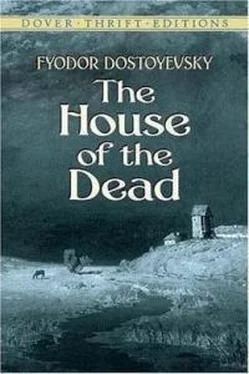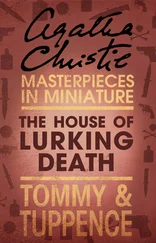They arrived at the barracks about six o'clock in the morning; there was nobody with them. After having worked about an hour, Koulikoff and A—v told Chilkin that they were going to the workshop to see some one, and fetch a tool they wanted. They had to go carefully to work with Chilkin, and speak in as natural a tone as they could. The man was from Moscow, by trade a stove–maker, sharp and cunning, keen–sighted, not talkative, fragile in appearance, with little flesh on his bones. He was the sort of person who might have been expected to pass his life in honest working dress, in some Moscow shop, yet here he was in the "special section," after many wanderings and transfers among the most formidable military criminals; so fate had ordered.
What had he done to deserve such severe punishment? I had not the least idea; he never showed the least resentment or sour feeling, and went on in a quiet, inoffensive way; now and then he got as drunk as a lord; but, apart from that, his conduct was perfectly good. Of course he was not in the secret, so he had to be thrown off the scent. Koulikoff told him, with a wink, that they were going to get some brandy, which had been hidden the day before in the workshop, which suited Chilkin's book perfectly; he had not the least notion of what was up, and remained alone with the young recruit, while Koulikoff, A—v, and Kohler betook themselves to the suburbs of the town.
Half–an–hour passed; the men did not come back. Chilkin began to think, and the truth dawned upon him. He remembered that Koulikoff had not seemed at all like himself, that he had seen him whispering and winking to A—v; he was sure of that, and the whole thing seemed suspicious to him. Kohler's behaviour had struck him, too; when he went off with the two convicts, the corporal had given the recruit orders what he was to do in his absence, which he had never known him do before. The more Chilkin thought over the matter the less he liked it. Time went on; the convicts did not return; his anxiety was great; for he saw that the authorities would suspect him of connivance with the fugitives, so that his own skin was in danger. If he made any delay in giving information of what had occurred, suspicion of himself would grow into conviction that he knew what the men intended when they left him, and he would be dealt with as their accomplice. There was no time to lose.
It came into his mind, then, that Koulikoff and A—v had become markedly intimate for some time, and that they had been often seen laying their heads together behind the barracks, by themselves. He remembered, too, that he had more than once fancied that they were up to something together.
He looked attentively at the soldier with him as escort; the fellow was yawning, leaning on his gun, and scratching his nose in the most innocent manner imaginable; so Chilkin did not think it necessary to speak of his anxieties to this man: he told him simply to come with him to the engineers' workshops. His object was to ask if anybody there had seen his companions; but nobody there had, so Chilkin's suspicions grew stronger and stronger. If only he could think that they had gone to get drunk and have a spree in the outskirts of the town, as Koulikoff often did. No, thought Chilkin, that was not so. They would have told him, for there was no need to make a mystery of that. Chilkin left his work, and went straight back to the jail.
It was about nine o'clock when he reached the sergeant–major, to whom he mentioned his suspicions. That officer was frightened, and at first could not believe there was anything in it all. Chilkin had, in fact, expressed no more than a vague misgiving that all was not as it should be. The sergeant–major ran to the Major, who in his turn ran to the Governor. In a quarter–of–an–hour all necessary measures were taken. The Governor–General was communicated with. As the convicts in question were persons of importance, it might be expected that the matter would be seriously viewed at St. Petersburg. A—v was classed among political prisoners, by a somewhat random official proceeding, it would seem; Koulikoff was a convict of the "special section," that is to say, as a criminal of the blackest dye, and, what was worse, was an ex–soldier. It was then brought to notice that according to the regulations each convict of the "special section" ought to have two soldiers assigned as escort when he went to work; the regulations had not been observed as to this, so that everybody was exposed to serious trouble. Expresses were sent off to all the district offices of the municipality, and all the little neighbouring towns, to warn the authorities of the escape of the two convicts, and a full description furnished of their persons. Cossacks were sent out to hunt them up, letters sent to the authorities of all adjoining Governmental districts. And everybody was frightened to death.
The excitement was quite as great all through the prison; as the convicts returned from work, they heard the tremendous news, which spread rapidly from man to man; all received it with deep, though secret satisfaction. Their emotion was as natural as it was great. The affair broke the monotony of their lives, and gave them something to think of; but, above all, it was an escape, and as such, something to sympathise with deeply, and stirred fibres in the poor fellows which had long been without any exciting stimulus; something like hope and a disposition to confront their fate set their hearts beating, for the incident seemed to show that their hard lot was not hopelessly unchangeable.
"Well, you see they've got off in spite of them! Why shouldn't we?"
The thought came into every man's mind, and made him stiffen his back and look at his neighbours in a defiant sort of way. All the convicts seemed to grow an inch taller on the strength of it, and to look down a bit upon the sub–officers. The heads of the place soon came running up, as you may imagine. The Governor now arrived in person. We fellows looked at them all with some assurance, with a touch of contempt, and with a very set expression of face, as though to say: "Well, you there? We can get out of your clutches when we've a mind to."
All the men were quite sure there would be a general searching of everything and everybody; so everything that was at all contraband was carefully hidden; for the authorities would want to show that precious wisdom of theirs which may be reckoned on after the event. The expectation was verified; there was a mighty turning of everything upside down and topsy–turvy, a general rummage, with the discovery of exactly nothing, as they might have known.
When the time came for going out to work after dinner the usual escorts were doubled. When night came, the officers and sub–officers on service came pouncing on us at every moment to see if we were off our guard, and if anything could be got out of us; the lists were gone over once more than the usual number of times, which extra mustering only gave more trouble for nothing; we were hunted out of the court–yard that our names might be gone through again. Then, when in barrack, they reckoned us up another time, as if they never could be done with the exercise.
The convicts were not at all disturbed by all this bustling absurdity. They put on a very unconcerned demeanour, and, as is always the case in such a conjuncture, behaved in the prettiest manner all that evening and night. "We won't give them any handle anyhow," was the general feeling. The question with the authorities was whether some among us were not in complicity with those who had got away, so a careful watch was kept over our doings, and a careful ear for our conversations; but nothing came of it.
"Not such fools, those fellows, as to leave anybody behind who was in the secret!"
"When you go at that sort of thing you lie low and play low!"
Читать дальше












